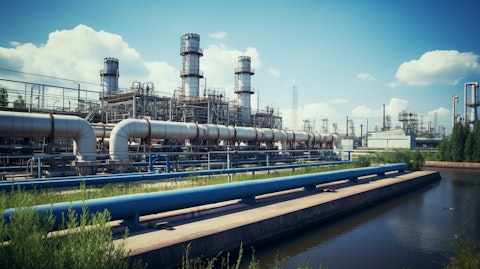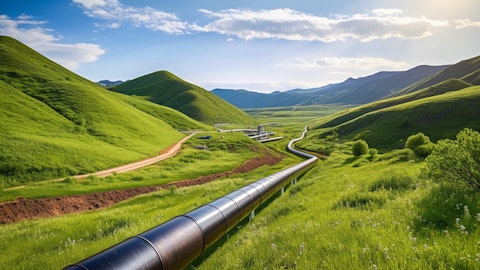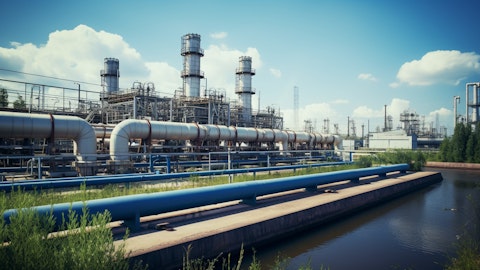Antero Midstream Corporation (NYSE:AM) Q1 2024 Earnings Call Transcript April 25, 2024
Antero Midstream Corporation isn’t one of the 30 most popular stocks among hedge funds at the end of the third quarter (see the details here).
Operator: Greetings, and welcome to Antero Midstream First Quarter 2024 Earnings Conference Call. At this time, all participants are in a listen-only mode. A question-and-answer session will follow the formal presentation. [Operator Instructions] As a reminder, this conference is being recorded. I would now like to turn the conference over to your host, Justin Agnew, Vice President of Finance and Investor Relations.
Justin Agnew: Good morning, and thank you for joining us for Antero Midstream’s first quarter investor conference call. We’ll spend a few minutes going through the financial and operating highlights, and then we’ll open it up for Q&A. I would also like to direct you to the homepage of our website at www.anteromidstream.com, where we have provided a separate earnings call presentation that will be reviewed during today’s call. Today’s call may also contain certain non-GAAP financial measures. Please refer to our earnings press release for important disclosures regarding such measures, including reconciliations to the most comparable GAAP financial measures. Joining me on the call today are Paul Rady, Chairman, CEO and President of Antero Resources and Antero Midstream; Brendan Krueger, CFO of Antero Midstream; and Michael Kennedy, CFO of Antero Resources and Director of Antero Midstream. With that, I’ll turn the call over to Paul.
Paul Rady: Thanks, Justin. Good morning, everyone. In my comments, I will discuss our capital projects completed in the first quarter, operational efficiencies in our water business and AR’s peer-leading free cash flow breakeven costs. Brendan will then go through our first quarter results, which set multiple company records. Let’s start with Slide number 3 titled Continued Asset Optimization. At the end of the first quarter, we placed our Grays Peak, compressor station in service as depicted in the light blue outline on the north part of our map. The station was the second compressor station that utilize relocated compressor units, which resulted in approximately $15 million in capital savings. Grays Peak has an initial capacity of 160 million cubic feet a day and will support the future throughput growth in the liquids-rich corridor of AR’s acreage position.
Importantly, Grays Peak was placed online slightly ahead of schedule and on budget. This exemplifies our just-in-time capital investment philosophy and integrated planning with Antero Resources. Looking ahead, you can see in the yellow highlighted box, where the future expansion of the Grays Peak station will occur. Our visibility into the future development of our dedicated acreage allows us to phase in capacity over time as needed. This maximizes our project rates of return and drives our peer-leading return on invested capital. In addition to our capital efficiencies, we had significant operational efficiencies on the freshwater side of the business, highlighted on Slide number 4 titled 2024 Completion Efficiencies. During the first quarter, Antero Midstream delivered 113,000 barrels per day of freshwater to AR, who was running 1.3 completion crews on average.
The last time AM delivered a similar amount of water during the quarter. AR was running two completion crews on average. So, this is a 35% improvement. As depicted on the left-hand side of the page, AR averaged 11.3 completion stages per day, which is a quarterly company record and a 44% increase compared to 2022. This performance is partially due to AM’s integrated freshwater delivery system. This system provides industry-leading water deliverability rates and eliminates the need for water trucks which significantly reduces congestion on our pad sites. In addition, an underappreciated aspect of our operations is the integrated planning between AR and AM. This starts with efficient pad design incorporating gathering and water lines and there’s consistent communication between upstream and midstream teams and the elimination of non-productive time.

To put our planning [00:06:51] into perspective since AM acquired the water business almost a decade ago, we have had zero missed completions with our freshwater delivery system, which is an outstanding achievement. Adding to the development stability at AR is its premium natural gas price realizations highlighted on Slide 5, titled, Not All Transport to the U.S. Gulf Coast is Equal. This map illustrates AR’s firm transportation portfolio directly into the heart of the LNG corridor, with several new LNG facilities starting up over the next several years, we expect to see a widening spread between sales points near Henry Hub and sales points outside of the Tier 1 markets. The blue callout box highlights a recent quote from a research commodity team that emphasizes this view.
They believe sales points within 100 miles of Henry Hub could see prices above $5 per MMBtu, while sales points outside of that range comprised at $3 to $4 per MMBtu. Importantly, 75% of AR’s firm transportation delivers gas to these Tier 1 markets, providing direct exposure to these premium-priced markets. This solidifies AM’s position as the critical first mile infrastructure to supply LNG across the globe. I’ll finish my comments on Slide number 6 titled AR has the lowest free cash flow breakevens. We previously put this slide out highlighting that AR’s breakeven natural gas price was $2.27 on an unhedged basis. As you can see on the left-hand side of the page, AR generated approximately $10 million of unhedged free cash flow in the first quarter of 2024 and when NYMEX gas averaged $2.24 per MMBtu.
In combination, AR’s capital efficiency, liquids pricing uplift and premium natural gas price realizations results in development stability that underpins AM’s consistency. As a midstream provider, we desire to service producers with the lowest overall breakeven costs, and AR certainly meets that test. With that, I will turn the call over to Brendan.
Brendan Krueger: Thanks, Paul. I will begin my comments on Slide number 7 titled First Quarter 2024 Highlights. The first quarter of 2024 was a record-breaking quarter, both financially and operationally. Antero Midstream’s organic growth strategy delivered a 4% and 6% increase in gathering and processing volumes, respectively, compared to last year. We delivered double-digit EBITDA growth, combined with double-digit declines in capital year-over-year. The growing EBITDA and declining capital resulted in $182 million of free cash flow before dividends and $74 million of free cash flow after dividends, both of which were company records. All of this record free cash flow was utilized to reduce absolute debt during the quarter.
In combination, our EBITDA growth and declining debt resulted in leverage declining to 3.1x and from 3.3x at year-end 2023. The strong first quarter results place us on track to achieve our full year 2024 guidance. Looking ahead to the second quarter, we expect modest throughput growth compared to the first quarter offset by lower expected fresh water delivery volumes as a result of AR reducing its completion crews to one in February, consistent with our full year guidance. I’ll finish my comments on Slide number 8, titled Executing on Debt and Leverage Reduction Plan. This page illustrates AM’s free cash flow after dividends and leverage since we announced our 3x leverage target on our fourth quarter 2022 earnings release. As you can see, after the initial outspend to fund the drilling partnership growth in the first half of 2022, we transitioned to generate consistent free cash flow after dividends.
The first quarter represented the seventh consecutive quarter of generating free cash flow after dividends, which totaled almost $270 million on a cumulative basis. This has been used to reduce absolute debt and internally financed two highly accretive bolt-on acquisitions. In summary, our business continues to operate as efficiently as any midstream company in the industry and delivers consistent returns through commodity cycles. We are on track to achieve our 3x leverage target in the back half of 2024, which is almost 1.5 years ahead of our initial target laid out at the end of 2020. This positions AM to pursue incremental return of capital to shareholders. With that, operator, we are ready to take questions.
See also 15 Fastest Growing Cities in Tennessee and 15 Countries with the Negative Population Growth in the World.
Q&A Session
Follow American Greetings Corp (NYSE:AM)
Follow American Greetings Corp (NYSE:AM)
Receive real-time insider trading and news alerts
Operator: [Operator Instructions] Our first question comes from Naomi Marfatia with UBS. Please proceed with your question.
Naomi Marfatia: Maybe to start, if you could touch on the theme of increased demand for power related to AI and data centers. Just curious on the opportunity set that AM has and if you’ve taken any steps to commercialize on this AI trend.
Paul Rady: So, on the data center, I don’t know if you caught the AR call, but we went through how much demand is coming from that in our basin, but also went through our firm transport portfolio to the Gulf Coast, and that’s where we’re going to be directing all of our gas. All competition is good. Gulf Coast, we think we’ll get the premium for that. So that’s where AR is focused. And of course, that would underpin AM’s investments and allowing visibility into decades worth of development of this asset.
Naomi Marfatia: Maybe to switch gears to some ROE opportunities. AM did announce buyback authorization last quarter and indicated that buybacks to start hitting to start post hitting the 3x leverage target. Since we’re almost there, how should we think about the timing of buybacks and capital allocation priorities between M&A and buybacks?
Brendan Krueger: Yes. Thanks for the question. This is Brendan. I think as we’ve talked about on past calls as well, I mean, we look at everything in terms of return and on overall capital. So, as we approach this 3x leverage target, as we mentioned, second half of this year, we’ll look to — it will be positioned us well to buy back shares or pay down further debt or execute for the bolt-on acquisitions. We’ve got the $500 million program out there, as you mentioned, and we do see attractiveness in our shares still today. So, as we sit here today, share buybacks would continue to make a lot of sense, but we’ll certainly evaluate that as we as we hit that 3x target, hopefully, in the second half of this year.
Operator: Our next question comes from John Mackay with Goldman Sachs. Please proceed with your question.
John Mackay: Maybe we’ll pick up that last one a little bit, maybe not to put words in your mouth, but it does — it had sounded like the buyback was kind of clearly front of the line for capital allocation decisions. I just maybe looking for a clarification on the last comment there. Are you guys seeing maybe more bolt-on opportunities than you’d expected before that look a little more attractive? I guess just curious if that kind of stack has changed at all? Or maybe I’m just reading a little too much into your last comment there?
Brendan Krueger: Yes. No, I mean, I think it’s the same messaging we’ve been giving over the last several quarters, which is share buybacks as we sit here today, continue to make a lot of sense for further return of capital. To the extent we come across opportunities similar to past opportunities on the bolt-on where you’ve got high visibility into the assets, and we’ll certainly look at those type of opportunities, but share buybacks do continue to make a lot of sense as we look at return of capital today.
John Mackay: Okay. No, that’s absolutely clear. Maybe just shifting gears. On the AR call, there was a comment around there’s the one pad. I guess, in the third quarter that could push to the right or be deferred a little bit given where dry gas pricing is right now. Maybe if you could just kind of frame up for us, what that could mean for AM volumes back half of the year? I imagine it’s a relatively small impact, but maybe just tie that together for us.
Michael Kennedy: Yes. This is Mike. It would not come on this year. So, it had no impact on AM volumes.
John Mackay: Maybe just comment on the water side then?
Michael Kennedy: Just on the water side.
Operator: Our next question comes from Zack Van Everen with TPH & Company. Please proceed with your question.
Zack Van Everen: Just a follow-up from the AR call, it sounds like they revised up their guidance kind of on the liquids-rich area a little bit. Does that just provide more confidence around your volume forecast of flat to slight growth or are you guys leaning more towards that slight growth kind of higher end of the volume guidance?
Brendan Krueger: No. I think AR was solely really driven by the liquid side of banks. So, no change on the AM front, just overall, I think, solidifies the guidance we put out there already.
Zack Van Everen: Got you. That makes sense. And then it does look like your guys’ JV frac is full. I know in previous calls, you mentioned there’s plenty of capacity in the area on [non-baby] fracs. Do you guys have to pay any third-party frac fees? And if so, would those show up just in direct OpEx under the G&P segment?
Brendan Krueger: Yes, we don’t have any fees we’re paying on that front, so nothing to note there.
Operator: Our next question comes from Ned Baramov with Wells Fargo. Please proceed with your question.
Ned Baramov: One more on capital allocation, if I may. I caught the approximately $2 million repurchase of your 2026 senior notes. So, could you maybe elaborate a little bit more on the decision to buy back debt in the first quarter and whether your capital allocation framework assumes further debt paydown this year?


